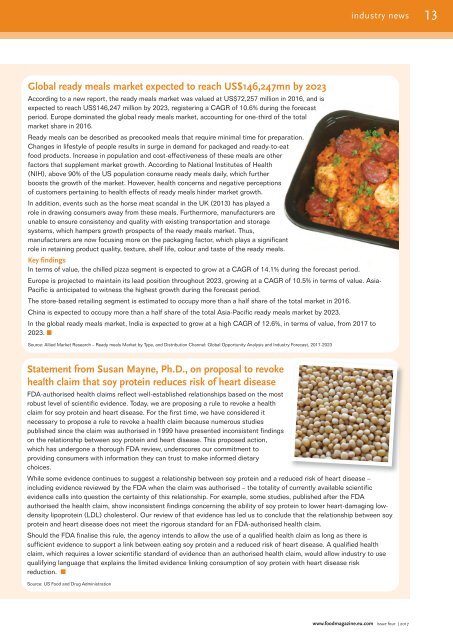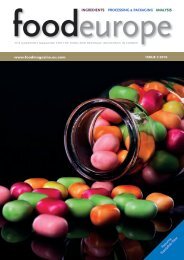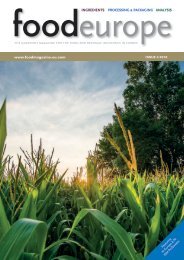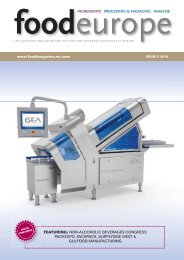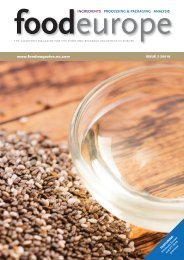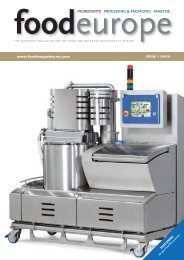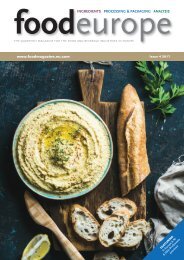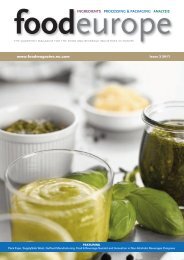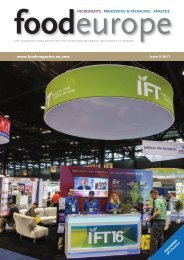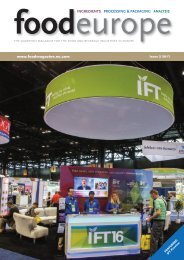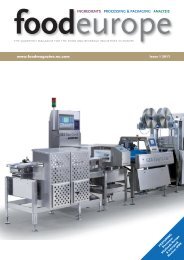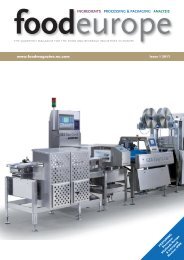Issue_4_2017_2
You also want an ePaper? Increase the reach of your titles
YUMPU automatically turns print PDFs into web optimized ePapers that Google loves.
industry news<br />
13<br />
Global ready meals market expected to reach US$146,247mn by 2023<br />
According to a new report, the ready meals market was valued at US$72,257 million in 2016, and is<br />
expected to reach US$146,247 million by 2023, registering a CAGR of 10.6% during the forecast<br />
period. Europe dominated the global ready meals market, accounting for one-third of the total<br />
market share in 2016.<br />
Ready meals can be described as precooked meals that require minimal time for preparation.<br />
Changes in lifestyle of people results in surge in demand for packaged and ready-to-eat<br />
food products. Increase in population and cost-effectiveness of these meals are other<br />
factors that supplement market growth. According to National Institutes of Health<br />
(NIH), above 90% of the US population consume ready meals daily, which further<br />
boosts the growth of the market. However, health concerns and negative perceptions<br />
of customers pertaining to health effects of ready meals hinder market growth.<br />
In addition, events such as the horse meat scandal in the UK (2013) has played a<br />
role in drawing consumers away from these meals. Furthermore, manufacturers are<br />
unable to ensure consistency and quality with existing transportation and storage<br />
systems, which hampers growth prospects of the ready meals market. Thus,<br />
manufacturers are now focusing more on the packaging factor, which plays a significant<br />
role in retaining product quality, texture, shelf life, colour and taste of the ready meals.<br />
Key findings<br />
In terms of value, the chilled pizza segment is expected to grow at a CAGR of 14.1% during the forecast period.<br />
Europe is projected to maintain its lead position throughout 2023, growing at a CAGR of 10.5% in terms of value. Asia-<br />
Pacific is anticipated to witness the highest growth during the forecast period.<br />
The store-based retailing segment is estimated to occupy more than a half share of the total market in 2016.<br />
China is expected to occupy more than a half share of the total Asia-Pacific ready meals market by 2023.<br />
In the global ready meals market, India is expected to grow at a high CAGR of 12.6%, in terms of value, from <strong>2017</strong> to<br />
2023. ■<br />
Source: Allied Market Research – Ready meals Market by Type, and Distribution Channel: Global Opportunity Analysis and Industry Forecast, <strong>2017</strong>-2023<br />
Statement from Susan Mayne, Ph.D., on proposal to revoke<br />
health claim that soy protein reduces risk of heart disease<br />
FDA-authorised health claims reflect well-established relationships based on the most<br />
robust level of scientific evidence. Today, we are proposing a rule to revoke a health<br />
claim for soy protein and heart disease. For the first time, we have considered it<br />
necessary to propose a rule to revoke a health claim because numerous studies<br />
published since the claim was authorised in 1999 have presented inconsistent findings<br />
on the relationship between soy protein and heart disease. This proposed action,<br />
which has undergone a thorough FDA review, underscores our commitment to<br />
providing consumers with information they can trust to make informed dietary<br />
choices.<br />
While some evidence continues to suggest a relationship between soy protein and a reduced risk of heart disease –<br />
including evidence reviewed by the FDA when the claim was authorised – the totality of currently available scientific<br />
evidence calls into question the certainty of this relationship. For example, some studies, published after the FDA<br />
authorised the health claim, show inconsistent findings concerning the ability of soy protein to lower heart-damaging lowdensity<br />
lipoprotein (LDL) cholesterol. Our review of that evidence has led us to conclude that the relationship between soy<br />
protein and heart disease does not meet the rigorous standard for an FDA-authorised health claim.<br />
Should the FDA finalise this rule, the agency intends to allow the use of a qualified health claim as long as there is<br />
sufficient evidence to support a link between eating soy protein and a reduced risk of heart disease. A qualified health<br />
claim, which requires a lower scientific standard of evidence than an authorised health claim, would allow industry to use<br />
qualifying language that explains the limited evidence linking consumption of soy protein with heart disease risk<br />
reduction. ■<br />
Source: US Food and Drug Administration<br />
www.foodmagazine.eu.com issue four | <strong>2017</strong>


